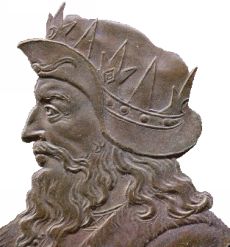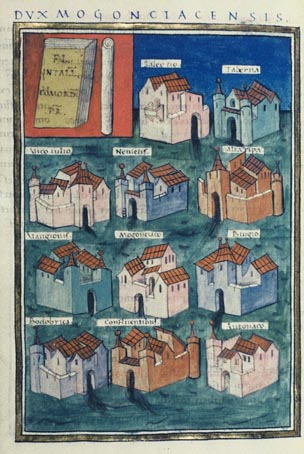Sources
- Gregory of Tours, Historiën, Book II - paragraph 9.
- Claudian, Loeb classical Library, On Stilicho's Consulship (translation Platnauer)
- Edward James, De Franken
Sunno was a leader (dux) of the Franks in the late 4th century who invaded the Roman Empire in the year 388 when the usurper and leader of the whole of Roman Gaul, Magnus Maximus was surrounded in Aquileia by Theodosius I.
The invasion is documented by Gregory of Tours who cited the now-lost work of Sulpicius Alexander. According to this account, Marcomer, Sunno and Genobaud invaded the Roman provinces Germania Inferior and Belgia. They broke through the limes and killed many people, destroyed the most fruitful lands and made the city of Cologne panic. After this raid the main body of the Franks moved back over the river Rhine with their booty while some remained in the Belgian woods. When the Roman generals Magnus Maximus, Nanninus and Quintinus heard the news in Trier, they attacked those remaining Frankish forces and killed many of their number. After this engagement, Quintinus crossed the Rhine to punish the Franks in their own country, however his army was surrounded and beaten. Some Roman soldiers drowned in the marshes, others were killed by Franks, few made it back to their empire.
Nanninus and Quintinus were replaced by Charietto and Syrus, who were again confronted by an attack of unidentified Franks.
Later after the fall of Magnus Maximus, Marcomer and Sunno held a short meeting about the recent attacks with the Frank Arbogastes, who was a general (magister militum) in the Roman army. The Franks delivered hostages as usual and Arbogastes returned to his winter quarters in Trier.
A couple of years later when Arbogastes had seized power and the West Roman army was nearly completely in the hands of Frankish mercenaries, he crossed the Rhine with a Roman army into Germania because he hated his own kin. Marcomer was seen with Chatti and Ampsivarii but the two did not engage.
Later we hear from the poet Claudian that Marcomer was arrested by Romans and banned to a villa in Tuscany. His brother Sunno crossed the Rhine and tried to set himself up as leader of Marcomer's band, but he was killed by his own people.
According to the later Liber Historiae Francorum, Marcomer tried to unite the Franks after the death of Sunno. He proposed that the Franks should live under one king and proposed his own son Pharamond for the kingship. This source does not tell us if Marcomer succeeded but from other sources it may seem that Pharamond was regarded as the first king of the Francs. However, this account of the Liber Historiae Francorum is not accepted as historical by modern scholars such as Edward James because Marcomer is therein called the son of the Trojan king Priam, and Sunno the son of Antenor, obviously impossible because Priam and Antenor lived hundreds of years earlier.
Year 388 (CCCLXXXVIII) was a leap year starting on Saturday of the Julian calendar. At the time, it was known as the Year of the Consulship of Augustus without colleague. The denomination 388 for this year has been used since the early medieval period, when the Anno Domini calendar era became the prevalent method in Europe for naming years.

The Chatti were an ancient Germanic tribe whose homeland was near the upper Weser (Visurgis) river. They lived in central and northern Hesse and southern Lower Saxony, along the upper reaches of that river and in the valleys and mountains of the Eder and Fulda regions, a district approximately corresponding to Hesse-Kassel, though probably somewhat more extensive. They settled within the region in the first century BC. According to Tacitus, the Batavians and Cananefates of his time, tribes living within the Roman Empire, were descended from part of the Chatti, who left their homeland after an internal quarrel drove them out, to take up new lands at the mouth of the Rhine.
Aegidius was the ruler of the short-lived Kingdom of Soissons from 461 to 464/465. Before his ascension he was an ardent supporter of the Western Roman emperor Majorian, who appointed him magister militum per Gallias in 458. After the general Ricimer assassinated Majorian and replaced him with Emperor Libius Severus, Aegidius rebelled and began governing his Gallic territory as an independent kingdom. He may have pledged his allegiance to the Eastern Roman emperor Leo I.

The Revolt of the Batavi took place in the Roman province of Germania Inferior between AD 69 and 70. It was an uprising against the Roman Empire started by the Batavi, a small but militarily powerful Germanic tribe that inhabited Batavia, on the delta of the river Rhine. They were soon joined by the Celtic tribes from Gallia Belgica and some Germanic tribes.

Pharamond, also spelled Faramund, is a legendary early king of the Franks, first referred to in the anonymous 8th-century Liber Historiae Francorum, which depicts him as the first king of the Franks.

Chlodio, also Clodio, Clodius, Clodion, Cloio or Chlogio, was a Frankish king who attacked and then apparently ruled Roman-inhabited lands around Cambrai and Tournai, near the modern border of Belgium and France. He is known from very few records.
Marcomer, also spelled Marcomeres, Marchomer, or Marchomir was a Frankish Dux in the late 4th century who assisted in an invasion of the Roman Empire in the year 388, as the usurper and leader of the whole of Roman Gaul, Magnus Maximus, was surrounded by Theodosius I in the city of Aquileia.

The Sicambri were a Germanic people who lived in the area between the Rhine, Lippe, and Wupper rivers, in what is now Germany, near the border with the Netherlands. They were first reported by Julius Caesar, who encountered them in 55 BC. They became a significant opponent of Roman imperial power in the Rhine region. After a major defeat by the Romans in 8 BC a significant part of the Sicambri were moved into Roman territory.

This is a chronology of warfare between the Romans and various Germanic peoples. The nature of these wars varied through time between Roman conquest, Germanic uprisings, later Germanic invasions of the Western Roman Empire that started in the late second century BC, and more. The series of conflicts was one factor which led to the ultimate downfall of the Western Roman Empire in particular and ancient Rome in general in 476.

The Chamavi, Chamãves or Chamaboe (Χαμαβοί) were a Germanic tribe of Roman imperial times whose name survived into the Early Middle Ages. They first appear under that name in the 1st century AD Germania of Tacitus as a Germanic tribe that lived to the north of the Lower Rhine. Their name probably survives in the region today called Hamaland, which is in the Gelderland province of the Netherlands, between the IJssel and Ems rivers.

The Vangiones appear first in history as an ancient Germanic tribe of unknown provenance. They threw in their lot with Ariovistus in his bid of 58 BC to invade Gaul through the Doubs river valley and lost to Julius Caesar in a battle probably near Belfort. After some Celts evacuated the region in fear of the Suebi, the Vangiones, who had made a Roman peace, were allowed to settle among the Mediomatrici in northern Alsace.. They gradually assumed control of the Celtic city of Burbetomagus, later Worms.
Liber Historiae Francorum is a chronicle written anonymously during the 8th century. The first sections served as a secondary source for early Franks in the time of Marcomer, giving a short breviarum of events until the time of the late Merovingians. The subsequent sections of the chronicle are important primary sources for the contemporaneous history. They provide an account of the Pippinid family in Austrasia before they became the most famous Carolingians.

The Franks were a western European people during the Roman Empire and Middle Ages. They began as a Germanic people who lived near the Lower Rhine, on the northern continental frontier of the empire. They subsequently expanded their power and influence during the Middle Ages, until much of the population of western Europe, particularly in and near France, were commonly described as Franks, for example in the context of their joint efforts during the Crusades starting in the 11th century. A key turning point in this evolution was when the Frankish Merovingian dynasty based within the collapsing Western Roman Empire first became the rulers of the whole region between the rivers Loire and Rhine. From this starting point they imposed power over many other post-Roman kingdoms both inside and outside the old empire.
Arbogast or Arbogastes was a Roman army officer of Frankish origin. He won distinction in the service of the emperor Gratian, and was subsequently entrusted by Theodosius I with the guardianship of the underage Valentinian II. The death of Valentinian in mysterious circumstances, and the rise of the controversial Eugenius, led to a civil war in which Arbogast perished.
Genobaud was a leader (dux) of the Franks. He invaded the Roman Empire in the year 388.
The pagan religion of the Germanic tribal confederation of the Franks has been traced from its roots in polytheistic Germanic paganism through to the incorporation of Greco-Roman components in the Early Middle Ages. This religion flourished among the Franks until the conversion of the Merovingian king Clovis I to Nicene Christianity, though there were many Frankish Christians before that. After Clovis I, Frankish paganism was gradually replaced by the process of Christianisation, but there were still pagans in the late 7th century.
The crossing of the Rhine River by a mixed group of barbarians which included Vandals, Alans and Suebi is traditionally considered to have occurred on the last day of the year 406. The crossing transgressed one of the Late Roman Empire's most secure limites or boundaries; as such, it has been considered a climactic moment in the decline of the Empire. It initiated a wave of destruction of Roman cities and the collapse of Roman civic order in northern Gaul. That, in turn, occasioned the rise of three usurpers in succession in the province of Britannia. Therefore, the crossing of the Rhine is a marker date in the Migration Period during which various Germanic tribes moved westward and southward from southern Scandinavia and northern Germania.

Silva Carbonaria, the "charcoal forest", was the dense old-growth forest of beech and oak that formed a natural boundary during the Late Iron Age through Roman times into the Early Middle Ages across what is now western Wallonia. The Silva Carbonaria was a vast forest that stretched from the rivers Zenne and the Dijle in the north to the Sambre in the south. Its northern outliers reached the then marshy site of modern Brussels.

The Frankish War of 431–432 was a short war between the Franks and the Western Roman Empire under Emperor Valentinian III. Like the previous Frankish war, the Roman army was led by the Roman general Aetius and the participation of Chlodio, the king of the Salian Franks is uncertain. The war ended in a Roman victory after which both sides agreed to a peace treaty.

The Frankish invasion of 388 was an armed conflict in northern Gaul and in free Germania east of the Rhine. A Frankish raid in 388 led to a short-lived war with the Western Roman Empire. Under the leadership of three rulers, groups of Franks crossed the Rhine border and invaded northern Gaul to plunder. The Roman response was not long in coming and resulted in a punitive expedition that was conducted deep into Frankish soil.